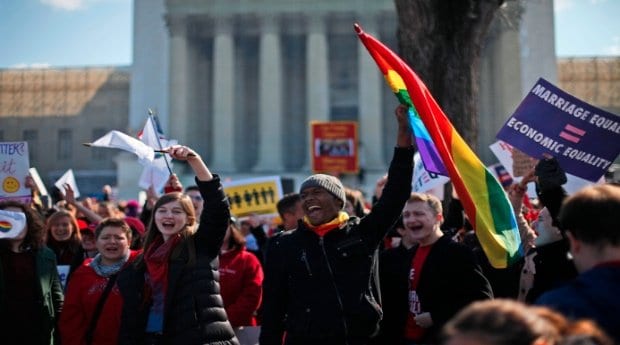“No more DOMA, no more DOMA,” a jubilant crowd chanted upon hearing the news that the US Supreme Court had struck down a key provision of the 1996 Defense of Marriage Act, ruling that legally married same-sex couples are entitled to the same federal benefits as heterosexual couples. ![]()
Check out footage of the reaction to the ruling on DOMA.
The American Civil Liberties Union (ACLU) and lawyer Roberta Kaplan represented Edie Windsor, 83, in her challenge of section 3 of DOMA, which required her to pay $363,000 in estate taxes after her partner and spouse of more than 40 years passed away. If Windsor had been married to a man, it is “undisputed that her estate tax bill would have been zero,” the Human Rights Campaign (HRC) noted.
Windsor’s reaction to the ruling? “I wanna go to Stonewall right now!” She then phoned a friend to tell her to “get married right away!” The New Yorker reports.
In a five-four opinion that Justice Anthony Kennedy wrote, the court found DOMA is unconstitutional under the 14th Amendment.
“DOMA’s avowed purpose and practical effect are to impose a disadvantage, a separate status, and so a stigma upon all who enter into same-sex marriages made lawful by the unquestioned authority of the States,” Kennedy wrote. “Under DOMA same-sex married couples have their lives burdened, by reason of government decree, in visible and public ways.”
On the question of Proposition 8, the court, also in a five-four majority, dismissed and vacated the 9th Circuit decision that ruled Prop 8 unconstitutional, because the state of California decided not to defend its own law. Prop 8 proponents were also found to have no standing to defend the law in federal courts after the state refused to appeal its loss at trial.
In his opinion for the majority, Chief Justice John Roberts wrote, “We have never before upheld the standing of a private party to defend the constitutionality of a state statute when state officials have chosen not to. We decline to do so for the first time here.”
The justices concluded that they had “no authority to decide this case on the merits.”
Roberts was joined in that view by Ruth Bader Ginsburg, Antonin Scalia, Stephen Breyer and Elena Kagan. Justice Anthony Kennedy dissented, joined by Clarence Thomas, Samuel Alito and Sonia Sotomayor.
Their ruling means that a federal district court’s 2010 decision to allow same-sex marriage to be legalized in California stands. In that ruling, Justice Vaughn Walker wrote, “Plaintiffs do not seek recognition of a new right. To characterize plaintiffs’ objective as ‘the right to same-sex marriage’ would suggest that plaintiffs seek something different from what opposite-sex couples across the state enjoy — namely, marriage. Rather, plaintiffs ask California to recognize their relationships for what they are: marriages.”
The US Supreme Court’s Prop 8 decision is unique to the state of California, leaving intact other same-sex marriage bans across the country. The bipartisan legal team of Ted Olson and David Boies argued the Prop 8 case before the nine Supreme Court justices.
The Washington Post‘s Jennifer Rubin points out a discrepancy in the DOMA and Prop 8 rulings, noting that the “US government didn’t defend DOMA in the Windsor case yet the court ruled in that case.” Rubin says it’s still unclear what states “can and cannot do regarding their own same-sex marriage laws.”
“Today’s historic decisions put two giant cracks in the dark wall of discrimination that separates committed gay and lesbian couples from full equality,” HRC president Chad Griffin said in a post-ruling statement. “While we celebrate the victory for Californians today, tomorrow we turn our attention to the millions of LGBT people who don’t feel the reach of these decisions. From the Rocky Mountains to the heart of the South, it’s time to push equality forward until every American can marry the person they love and all LGBT people are guaranteed equal protection under the law.”
Griffin added, “These decisions underscore the emergence of two Americas. In one, LGBT citizens are nearing full equality. In the other, our community lacks even the most basic protections. Everywhere that injustice still prevails, we will fight for justice. And our message to those who cement their feet on the wrong side of history is that we will win.”
Watch a video of the statement made by Kris Perry, one of the Prop 8 plaintiffs.


 Why you can trust Xtra
Why you can trust Xtra


